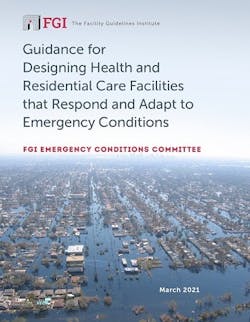Inclusivity, Access and Resilience: Much More than Meeting ADA
The Facility Guidelines Institute (FGI) released exciting news on the development of two important initiatives: the evaluation of inclusive environments and the launch of the Emergency Conditions Guidelines.
For the 2022 revision cycle of the hospital, outpatient and residential health, care and support guidelines, the tri-chairs from each of the document groups that are part of the Health Guidelines Revision Committee (HGRC) came together to evaluate the opportunity to include information on inclusive environments across the three documents.
Embracing Universal Design
Starting from the residential health, care and support facilities document group, there has been a movement to provide design information that positively impacts patients and residents in all settings, not only because the majority of patients and residents are 65-plus, but also because what works well from a universal design and inclusive perspective is good for everyone. In this context, inclusivity means not limiting anyone’s ability through the design and construction of the built environment in addition to fully understanding the users of any healthcare or long-term care setting to meet their broader needs.
Areas that have been proposed, commented and voted on include starting with the programming and planning process for user accommodation: “In evaluating the users of the facility, inclusive design features should be considered in the context of the intended users’ characteristics (e.g., age, body size, ability, cultural background, gender identity)” and under Cultural Responsiveness, “…including the demographics and culture of patients, staff and visitors.”
[Related: Why Acoustics Matter So Much in Medical Facilities]
The outpatient document guideline also includes “use of a universal design process supports the planning and design of inclusive environments by evaluating items such as walking distances, use of color, value contrast, lighting, wayfinding and selection of finishes” along with more detailed information and resources proposed in conjunction with the residential document group. Design recommendations on lighting for building users that have low vision are also included.
Further updates to the residential health, care and support facilities guidelines, which has a focus on person-centered care as a tenet, also include a section on comfort, wellbeing and dignity, which provide information and examples on not only physical access, but physical comfort and psychological, social and spiritual components of comfort and wellbeing. This is reinforced by recommending inclusive design support dignity and remove any and all sense of stigma from the built environment, support privacy, and ease of access to amenities, services and care.
Planning considerations are part of the residential document and utilization of universal design is defined as a process that enables and empowers a diverse population by improving human performance, health and wellness, and social participation (Steinfeld and Maisel, 2012), as included in the work completed at the University of Buffalo’s Center for Inclusive Design and Environmental Access (IDeA Center).
Overall, the opportunity to be able to support all users within healthcare settings is an exciting addition to the FGI Guidelines that will start in the new publication due out in January 2022 and provide a basis for future guideline development as white papers, resources listed under the FGI Beyond Fundamentals, and continual proposals for future revision cycles of the guidelines.
[Related: Can Greener Hospitals Save People and the Planet?]
Emergency Conditions Committee Tackles Adverse Event Planning
The other initiative that has been launched by the FGI is the Emergency Conditions White Paper and the draft Guidelines for Emergency Conditions, which is open for public comment until June 30, 2021. Using the definition of universal design as a process for inclusivity, the design of environments is based on maintaining access to services and hardening for resilience in the face of an adverse event, which include both manmade and natural events.
It was found that the impact of the COVID-19 pandemic on health and residential care facilities and their occupants, coupled with hazards from more frequent and challenging weather-related emergencies, has made plain that more guidance was needed. FGI assembled a 130-person Emergency Conditions Committee (ECC) and formed nine subcommittees to address nine topic areas: safety risk assessment, surge capacity, alternate care sites, modular construction, weather and man-made event resiliency, renovations and future facilities, small and/or rural facilities, residential/adult care settings, and operational considerations.
Although the ECC was convened in response to the pandemic, the committee embraced the opportunity to address design and operational considerations for emergencies that are local (e.g., floods, train derailments, mass shooter incidents), regional (e.g., tsunamis, earthquakes, hurricanes), and international (e.g., pandemics and other public health emergencies of international concern) in scale. This work was completed in less than a year and has resulted in providing timely information for impacting emergency preparedness, design considerations that will ultimately be incorporated within the FGI guidelines, and a proactive response to adverse events.
Congratulations and thanks are extended to each member of the ECC for volunteering to draft this much-needed guidance during an ongoing pandemic and an ongoing revision cycle (2022) of the existing guidelines for hospitals, outpatient facilities, and residential health, care, and support facilities. As stated from the FGI President, Ken Cates, “On behalf of the FGI Board of Directors, I extend our gratitude to all of the people who have worked on these documents. With the use of this information, we will be better prepared to handle future emergencies and assure improved outcomes for patients, residents and caregivers.”
Article compiled by Jane Rohde, JSR Associates, Inc. based upon information provided by Heather Livingston of the Facility Guidelines Institute and being a tri-chair participating on the 2022 cycle. Many thanks to Addie Abushousheh, tri-chair on the 2022 revision cycle and participant in the ECC, and John Shoesmith, tri-chair on the 2022 revision cycle and lead chair of the residential health, care, and support facilities team for the ECC.
About the Author:
Jane Rohde is the founder and principal of JSR Associates, Inc. in Catonsville, Maryland. Jane champions a global cultural shift toward de-institutionalizing senior living and healthcare facilities through person-centered principles, research and advocacy, and design of the built environment.
Read next: How This Innovative Medical and Wellness Center Helps Florida Residents Take Control of Their Health




